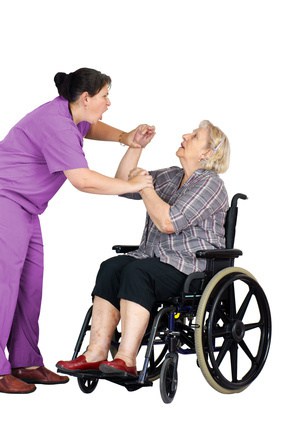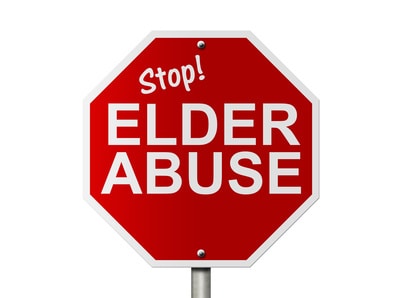Ideas and laws regarding how those in long-term care are treated have changed over the years. Today elder abuse in nursing homes is a hot topic.
Hidden cameras have been used by the families of residents to uncover ongoing abuse. New laws which punish abusers have aided in weeding out “bad apples”.
Good nursing homes are concerned with their reputations and want to be seen as providing the best of care. They view incidents of abuse within their facilities as a blight on that reputation.
WHERE WE’VE COME FROM
Sergeant John Keating has been a policeman for thirty years. These days he handles cases involving abuse against the elderly in nursing homes.
Keating remembers going to visit his grandparents in a nursing home and finding them tied to their wheelchairs.
At that time no one considered such tactics abuse.
Back then, even if a person was caught committing an act considered wrong or abusive, they were seldom charged with a crime.
Attitudes have changed since then and so has the law.
Along with all those changes, a mandatory requirement of a criminal background check for employees in the near future may address some of the abuse before it gets started.
WHAT IS HAPPENING NOW
 There is several types of abuse being found in long-term care today:
There is several types of abuse being found in long-term care today:
- Financial
- Physical/Verbal
- Sexual
- Psychological
- Medication theft
Financial abuse: It is the most prevalent form of elder abuse found today.
This can run the gamut from outright theft of residents’ money by those who are in charge of their care to family members who oversee the financial affairs of a resident refusing to use that money for the resident’s care.
The family member may sometimes ignore paying the rent for the resident or it may be more subtle, in that they don’t use the resident’s money to purchase basic necessities, such as toiletries, clothing or other personal items.
The resident is left helpless and without the things they need to maintain basic human dignity.
Physical abuse: This type of abuseis sometimes covered up as the result of a fall or other accident.
Seniors are often powerless to protect themselves, lacking the physical strength and, in some cases, the verbal abilities to prevent or report the abuse.
Residents face a myriad of attacks from those who react to their own frustration or need for power with physical or verbal aggression: pinches, slaps to the head, and hurtful and demeaning words.
A real incident…
In one case where a veteran PSW was training a new PSW. The veteran PSW told a resident it was time to get up and the resident refused. Not willing to lose face in front of a new trainee, the older PSW grabbed the man by the testicles and dragged him out of bed.
This type of abuse of power can be humiliating and devastating to the fragile health of a senior citizen.
Sexual abuse: It can be overlooked, particularly when it involves a resident who is non-verbal or bedridden.
Sexual abusers often pick this type of victim for this reason.
The abusers will even use the resident’s inability to speak as a sign of acquiescence, telling police the person didn’t tell them no, so it must have been okay with them.
There is also the difficulty of generational ideas when it comes to sexual abuse by a family member.
A real incident…
An eighty-year-old man who visited his bedridden, non-verbal wife in the nursing home and forced her to have sex with him.
When he was confronted with the abuse, he refused to accept that his actions were rape, telling the police that that was his wife and it was her duty to provide sex for him when he wanted it.
Psychological abuse: It is both subtle and damaging. Many times that devastation comes from thoughtless remarks not really intended to harm.
A real incident…
A resident was a very dignified man, well-dressed and proper. A week before the incident, the man had begun having to wear an adult diaper, a fact he did not wish anyone else to know.
While at the dining room table, he needed to go to the washroom and asked one of the staff to help him stand up. The staff person was busy and distracted and told him, in front of everyone there, that he was wearing his diaper and he could just pee in it.
Needless to say, the man was humiliated by this likely unintended psychological abuse.
Medication theft: It can be quite blatant, with residents having pain medication patches taken right off their bodies.
One of the ways in which this type of abuse is caught is the strict regulations surrounding the use and dispensing of narcotic medications.
A narcotic patch found to be missing from a resident who should have it is reported to the police.
SPOTTING SIGNS OF ABUSE
Here are some of the tips on spotting some forms of abuse faced by seniors in long-term care.
- Personal Support Workers can look for signs of physical abuse and ask themselves if they are consistent with a fall. He says that most seniors who fall bruise themselves on the elbows, knees or shins. Bruises and marks on the inner thighs, or other out of the way places are unlikely to be the result of an accident.
- In cases of sexual abuse, even where the victim is non-verbal or bedridden, there are signs to watch for. Spotting it is a matter of being aware and putting all the signs together.
A real incident…
A Personal Support Worker appeared to be very diligent at his job, checking on the resident often and always alone.
Looking back, the other staff members realized that every time he walked into that resident’s room, she would hunch her shoulders and turn her head.
They then understood that these were signs that she was frightened of him.
Off and on during the time of the abuse the resident would also have signs of vaginal bleeding. The condition didn’t last long and didn’t happen all the time so it was connected with potential abuse.
NO INNOCENT BYSTANDERS
 Changes in the laws implemented to prevent senior abuse also mandate that anyone who sees or knows of abuse must report it.
Changes in the laws implemented to prevent senior abuse also mandate that anyone who sees or knows of abuse must report it.
A person who knows of ongoing abuse and does not report it can face the loss of their own job or other consequences.
There are no innocent bystanders.
If a staff member’s report of possible abuse is ignored, he recommends they keep detailed notes of what they reported, to whom and when, along with contacting one of the hotlines designed to take reports of abuse.
RESPECT AND DIGNITY ARE IMPORTANT
One thing that all PSWs must consider all the time that will make a great difference in the quality of care they give is to keep in mind that all people desire to be respected.
Dignity is important to all of us and isn’t something a person should lose because they have grown older and need help.
The job of a Personal Support Worker comes with a great deal of stress and frustration.
When a person ages, it doesn’t always mean their personality changes. If someone is nasty at forty, the chance is they are going to be nasty at seventy or eighty, too.
This truth means there are going to be difficult residents who are a challenge to deal with. The best approach to maintaining a calm and respectful demeanor during those trying times, is to walk away for a moment.
This allows time to cool down and think about actions and words. The person can then return to the situation with a more positive attitude.






